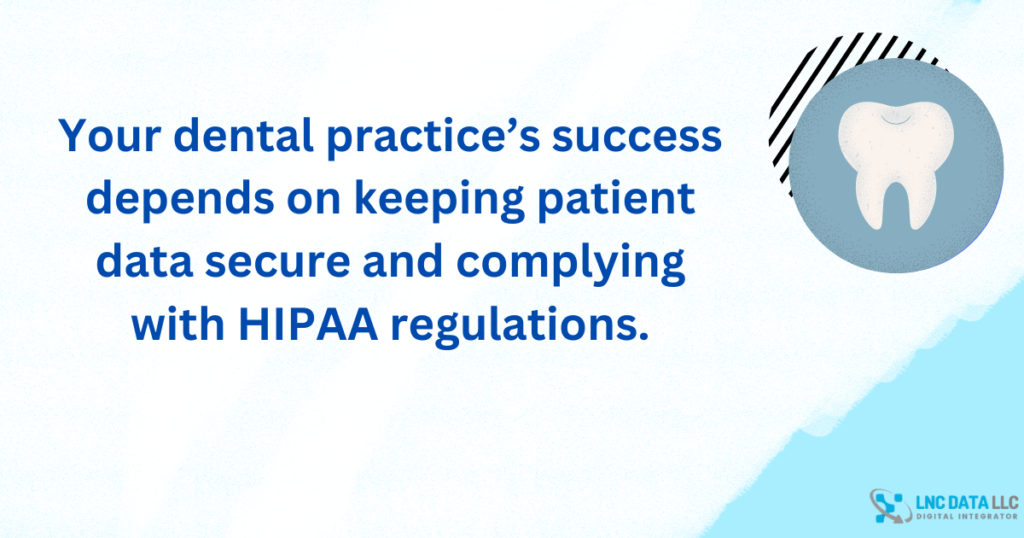
The cost of HIPAA non-compliance for dental practices can result in two types of penalties. One is civil penalties, and the second is criminal penalties (in some cases).
If you break any HIPAA rules, penalties depend on whether you are a dentist, health professional, business associate, or a member of either group.
General information about these penalties, to understand the risks of HIPAA non-compliance and how you can avoid these penalties as a dentist, is covered in this article.
Penalties of HIPAA Non-Compliance: What Dentists Need to Know
As a dentist, you are considered a covered entity under HIPAA law. HHS’ Office for Civil Rights can impose penalties on your practice or business association if you violate any law. These penalties include data breaches, unauthorized exposure of patient data, and even smaller violations. Penalty ranges can be from $141 to $2,134,831, depending on the extent of the violation. In addition to monetary penalties, you may also be required to follow a corrective action plan to ensure compliance moving forward.
Violating HIPAA can lead to serious criminal penalties. According to the U.S. Department of Health and Human Services Office for Civil Rights (OCR), anyone who knowingly obtains or discloses protected health information in violation of the Privacy Rule may face fines of up to $50,000 and up to one year in prison. If the violation involves false pretenses, the penalties increase to $100,000 and up to five years imprisonment. For cases where the intent is to sell, transfer, or use protected health information for commercial gain, personal benefit, or malicious harm, the penalties rise to $250,000 and up to 10 years in prison. The Department of Justice is responsible for prosecuting criminal violations of the Privacy Rule.
HIPAA violations can lead to hefty fines for dentists, putting their practices at risk. From unintentional mistakes to serious breaches, even minor lapses in compliance can result in penalties. Following are the most common violations and proactive steps to prevent them to protect patient data and avoid costly consequences.
Right of Access
According to HIPAA, patients must be able to access their medical records within 30 days of their request, and fees should remain reasonable. To avoid such penalties, promptly handle record requests, keep records organized, and charge reasonable fees. The OCR suggests a flat fee of up to $6.50 for providing records.
Social Media Use
Managing your dental practice’s reputation online is just as important as in person. However, HIPAA compliance is critical, and sharing a patient’s PHI (Protected Health Information) in any response is strictly prohibited.
A North Carolina dental practice was fined $50,000 for disclosing a patient’s PHI while responding to a negative review. Despite inaccuracies in the review, sharing PHI to deny it is never justifiable.
Cybersecurity Access
In today’s technology-driven world, dental practices rely heavily on digital systems to store and manage patient data. However, cybersecurity threats are on the rise, with hacking responsible for 77% of major healthcare breaches. Properly managing and training staff on technology use is critical to safeguarding patient information.
Cost of HIPAA compliance
HIPAA compliance costs have increased over the years, and healthcare professionals or entities often underestimate the cost of continuous compliance. From the initial prep work of HIPAA compliance to audit expenses and post-audit maintenance, the process is quite costly. The average cost of HIPAA compliance is between $80,000 and $120,000. However, being HIPAA compliant has many benefits that outweigh the costs of non-compliance.
How LNC DATA LLC Can Help
LNC DATA LLC provides tailored solutions to ensure your dental practice stays HIPAA-compliant and protected from costly violations. From secure data management and staff training to advanced cybersecurity measures, we help safeguard patient information, streamline operations, and mitigate risks. Partner with us to keep your practice efficient, compliant, and secure.